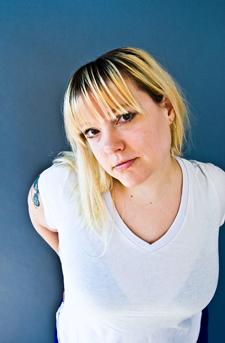I first read Zoe Whittall’s debut novel Bottle Rocket Hearts in June of 2007. It was the week I moved to Ottawa, and I finished it somewhere in the outskirts of Nepean, precariously balancing a cup of terrible train-station coffee on one knee and her book on the other.
It was something of a long, lonely train ride, leaving Belleville for a new life in Ottawa. But thanks to Whitall’s potent, distinctive novel I was already immersed in an urban, queer universe — the rural Ontario countryside passing me by in a cow-speckled blur.
Bottle Rocket Hearts won her a spot on the Globe and Mail Top 100 Books of 2007 list and Now Magazine’s prize for Best Emerging Writer that same year.
Now, a new book of poetry is bringing this up-and-coming queer author to Ottawa. Precordial Thump (2008, Exile Press) is a highly personal and semi-autobiographical collection, Whittall says, based on a defunct and messy relationship she had with a someone who lied to her consistently.
The book is, in part, about the narrator figuring out what is real and unreal in her relationship, with a bit of blending of the two.
The collection is primarily about “letting go of destructive relationships,” Whittall explains. In the vein of confessional poetry, Precordial Thump invites the reader to make educated guesses about which parts of the narrative actually happened.
“With Precordial Thump,” Whittall says, “I really wanted to examine the implied sincerity of confessional poetry.”
Down-to-earth and lacking the egotism often found in young, successful writers, 33-year old Whittall is funny, charming and ironic. This often comes through in her work, which is laden with thick tones of authorial personality. Bottle Rocket Hearts, for example, contains some of the most tragically funny and self-destructively entertaining characters to emerge out of Can Lit in recent memory.
Her careful style is sometimes quite subtle; a “precordial thump” for example, is a medical “strike” used to revive a patient who has had a heart attack, something which many readers would not pick up on, but is definitely fitting for the topic of her book.
Whittall lives in Toronto, where she is a full-time writer also working toward her master’s in creative writing. When asked what her bachelor’s is in, Whittall responds with a little laugh.
“Uh, well, that’s kind of a funny story,” she says, “because I don’t actually have a BA. I dropped out of Concordia after two years. It just wasn’t what I wanted to do.”
Originally interested in folk music and performance poetry, Whittall moved to Toronto shortly after leaving university, where she fell in love and has remained ever since. Holding down a variety of retail jobs, she decided what she really wanted to do was write.
“One day, I was working at this terrible retail job, and while I was behind the counter, I thought ‘I want to write novels.'”
This career move seems to have worked out well for her. With two other books of poetry and another novel in the works, Whittall is gaining national and international acclaim. She attended an international writer’s conference in France last year and was surprised to find how respected she felt there as a writer.
This, she says, contrasts with the sometimes ambivalent response Canadians seem to have about their artists. Moreover, it’s much tougher for Canadian writers to make a living than it is for their European cousins, she says.
“I think it’s a real shame we don’t value our writer’s as much as other countries do,” she says. “Here it’s a challenge just to put food on the table. You pretty much have to ‘buy’ your first novel now.”
Whittall, who has spent the last four months in self-described “seclusion” working on her upcoming novel, says she is looking forward to her visit because she’s been getting a little stir-crazy working away by herself.
“Ottawa is a city of readers,” she says. “I always have a good time whenever I go.”
Whether writing poetry or fiction, Whittall hopes to create something which speaks to her readers, whether they are queer or straight, Canadian or from elsewhere.
“I just love to read my work and to perform,” she says, “I try to connect with my audience when I’m doing a reading.”

 Why you can trust Xtra
Why you can trust Xtra


